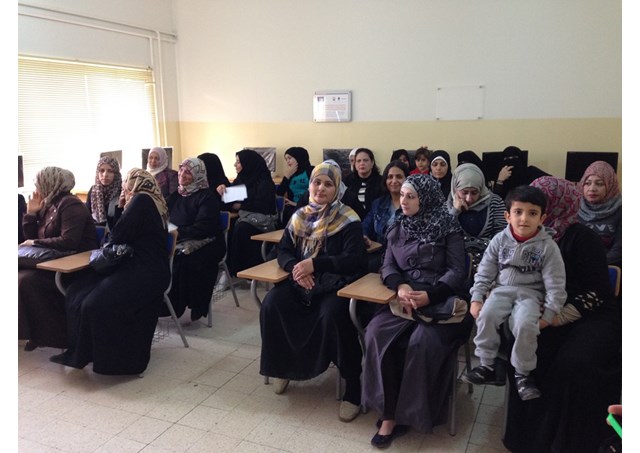
Caritas gives hope to Syrian/Iraqi refugees in Jordan

(Vatican Radio) Vatican Radio sends its journalists on assignment in Jordan to investigate the Catholic charity, Caritas' work among tens of thousands of Syrian and Iraqi refugees. In this, part two of Tracey McClure's series of programs and interviews, she goes to northern Jordan.
Listen to Tracey McClure's program:
Thirty pairs of eyes swiveled to look at us as we came through the door. Mostly women, in their twenties to their fifties - most wearing the traditional Muslim Hijab headscarf and a few the Niqab: only their eyes peeking out of a slender opening in dark cloth. A man and his son were the only males in the room.
I was visiting the bustling Caritas Jordan center in the northern city of Zarqa and these were Syrian women in a job training class - learning new skills. My guide, the Director of the local Caritas center, Fares Francis. He and his staff of 34 and 8 volunteers offer assistance to 8,000 Syrian families or about 40,000 people in Zarqa and environs. Now, they’re also trying to respond as quickly and efficiently as possible to the recent arrival of hundreds of Iraqi refugees fleeing militant extremism at home.
Most of the people who come to the center are women, children and the elderly – Syria’s most vulnerable, caught in the midst of a conflict they cannot begin to comprehend. The men, Fares explains, either stayed home to fight, are imprisoned or are dead.
Fares takes me to the kitchen with an industrial sized oven and a pot of boiling water on the stove. “This is where the women learn cooking skills and hygiene,” he explains. An aproned chef pops around the doorway with jars of pickled broccoli, cauliflower and carrots: “these are some of the things they learn to prepare so they can make money from home,” she smiles. (Later, we tuck into a mouth-watering lunch of tabouli salad and stuffed zucchini and rice – courtesy of Caritas’ cooking school students.)
But cooking is not all - they also can learn sewing techniques, baby care and how to care for the elderly . Another special course helps Syrian refugees integrate into Jordanian society, for many a foreign land with foreign customs.
Just in front of the kitchen is a colorful nursery where 6 young children are playing – some sitting round a table, coloring the faces of clowns and festooned unicorns. A blackboard notes that 13 children have come to the nursery so far this morning. “Mothers can drop off their young ones here so they can attend classes or visit our other offices upstairs,” explains Fares. He shows me a series of cubes bearing caricature faces on all sides: a frown, a smile, an angry snarl…
“These help us when a child who comes to us is obviously suffering or disturbed,” Fares says. The child is asked to point to the face that he most identifies with. Many Syrian children have seen death up close: losing a mother, father or family member in front of their eyes. “We’ll notify the parents and offer trauma counselling to try to help,” Fares explains, noting that they also offer psychological help to women who’ve lost everything or have suffered violence. Even the Caritas staff receives annual training for dealing with people in stressful situations.
Upstairs, there’s a waiting line of women and a handful of men – some have come for legal assistance to help them rent an apartment or sign a job contract. While hundreds of thousands of Jordan’s 1.5 million Syrian refugees live in overcrowded camps, many “escape” to cities and villages like Zarqa, looking for cheap lodging. For the most vulnerable families, Caritas helps pay the rent.
Others upstairs are here for a medical visit with one of Caritas’s doctors and nurses or with the nutritionist. There’s even a highly equipped dentist’s office. People with chronic diseases come regularly for check-ups and medication but Caritas has no power to help those with life-threatening diseases like cancer. These patients are referred to the United Nations’ Refugee agency which can help them get into a public hospital. Fares tells me of one patient who was able to receive a transplant operation because the worldwide Caritas Internationalis network mobilized to find the necessary funds.
Later, we bump into a man with a tool belt around his waist. Fares introduces him as one of Caritas’ engineers who inspects properties rented by refugees to ensure they are safe and as functional as possible. The neediest families get the fastest help: possibly a water heater, a new faucet, help with a faulty plumbing system or propane gas tank…
Caritas also distributes hygiene kits and food vouchers to families to purchase fresh fish, poultry and produce and dry foods. Refugees also receive vouchers to purchase clothing and shoes.
How can such a small operation accomplish so much? I wonder. Fares tells me that Caritas’s operations in Zarqa are almost fully funded by Caritas partners from Australia, Switzerland, Germany and others. “We here at Caritas need to be working on more projects,” says Fares to my surprise. “We’re doing just fine with what we have – but we could offer so much more.”
| All the contents on this site are copyrighted ©. |


